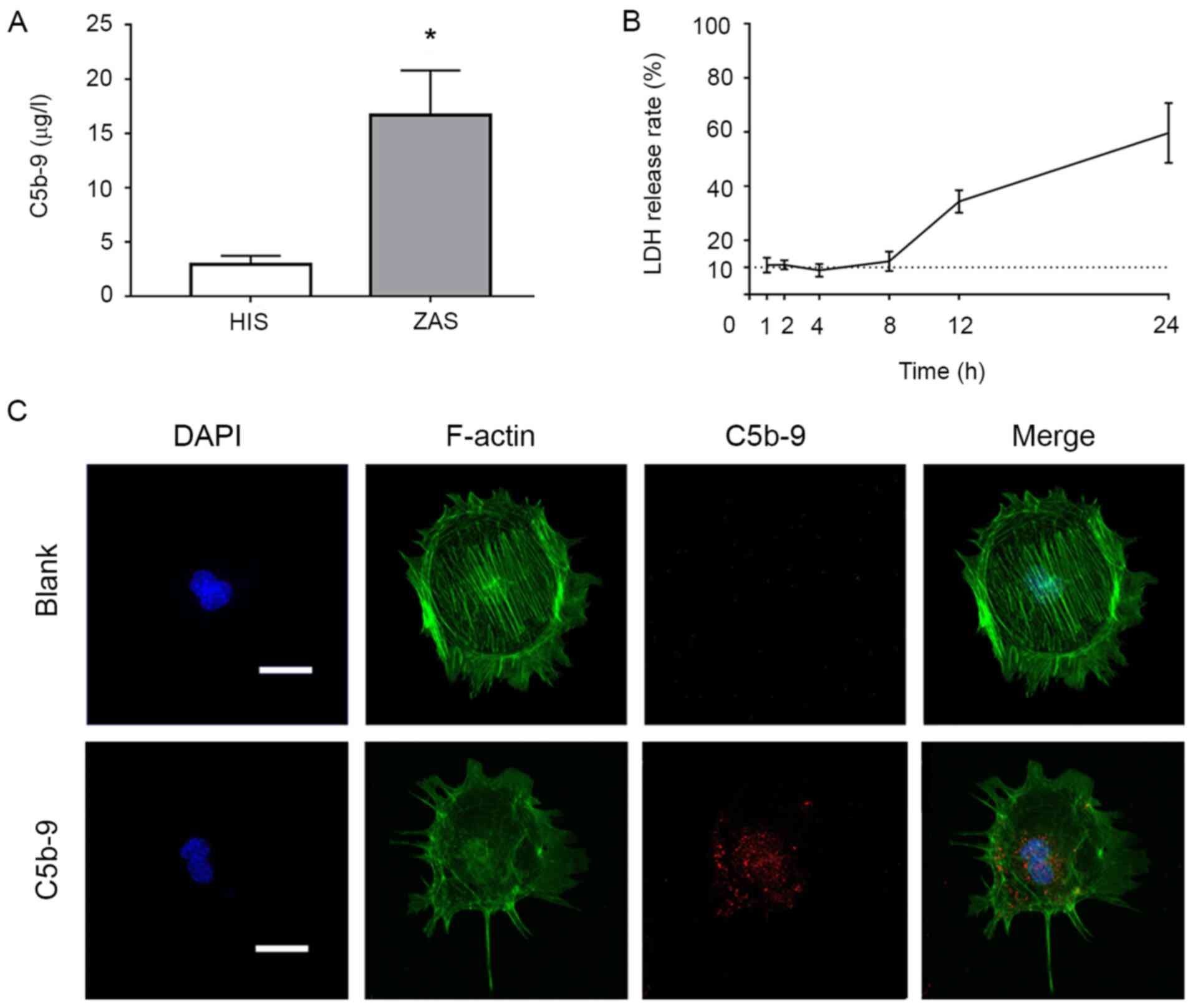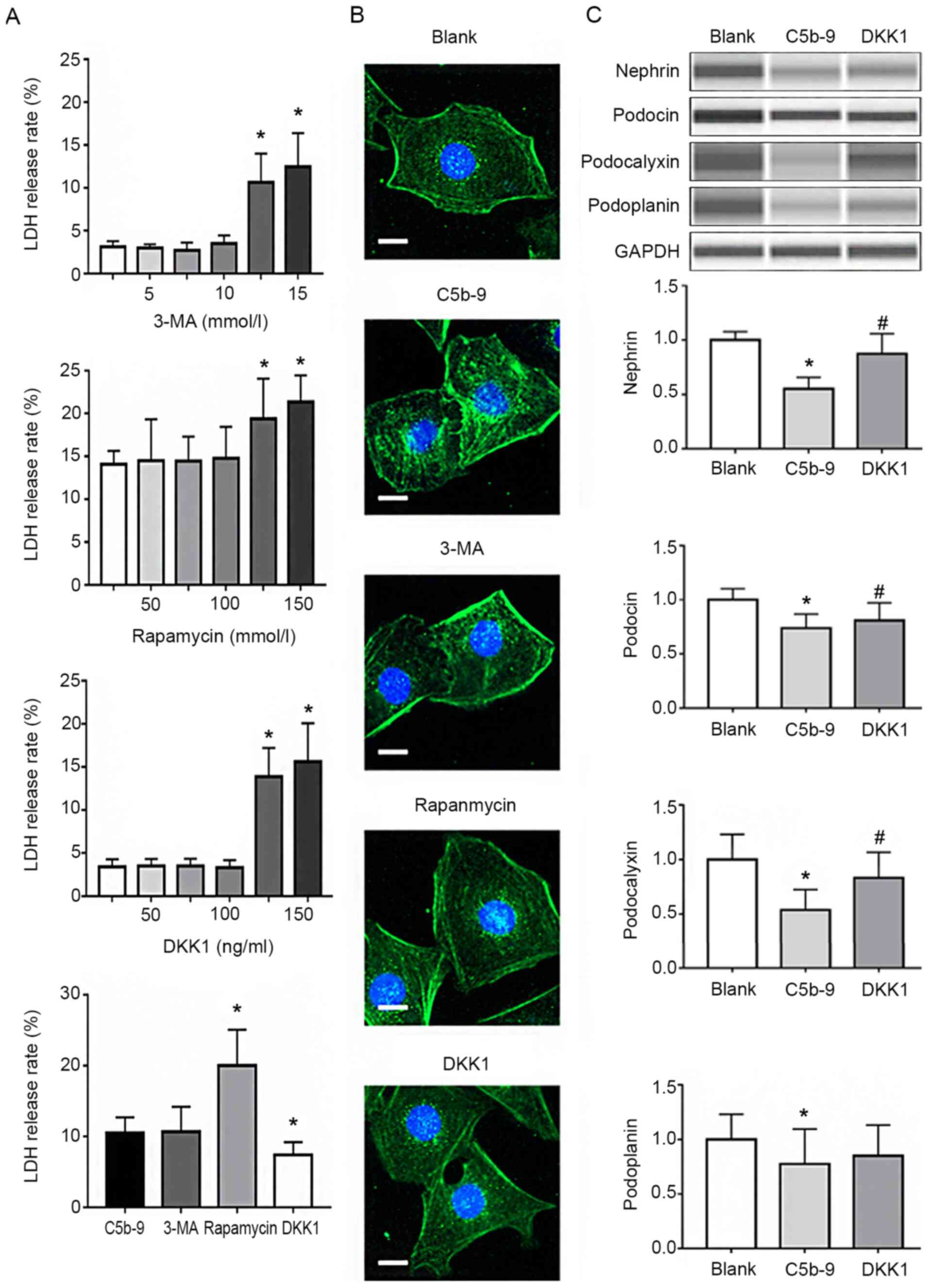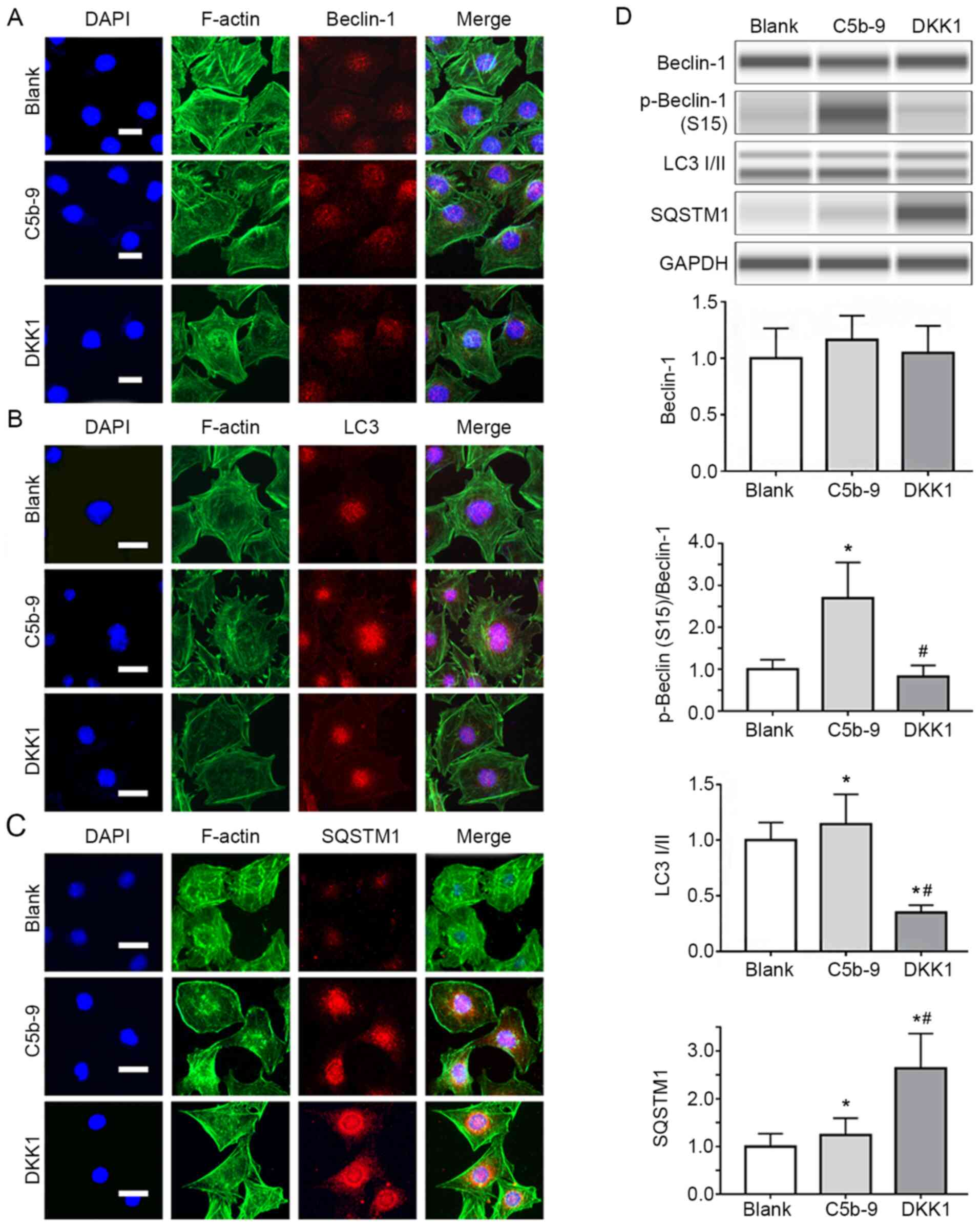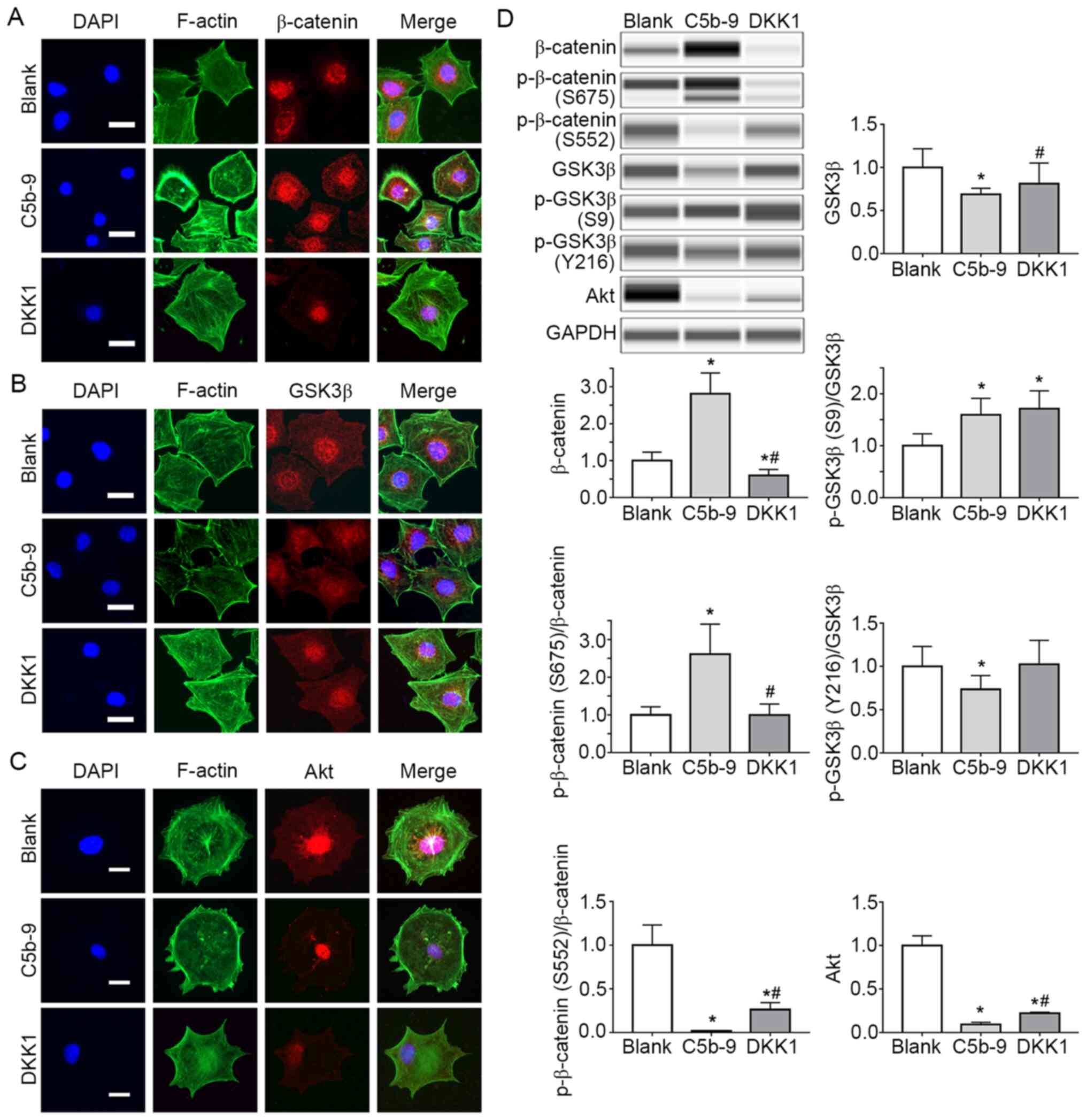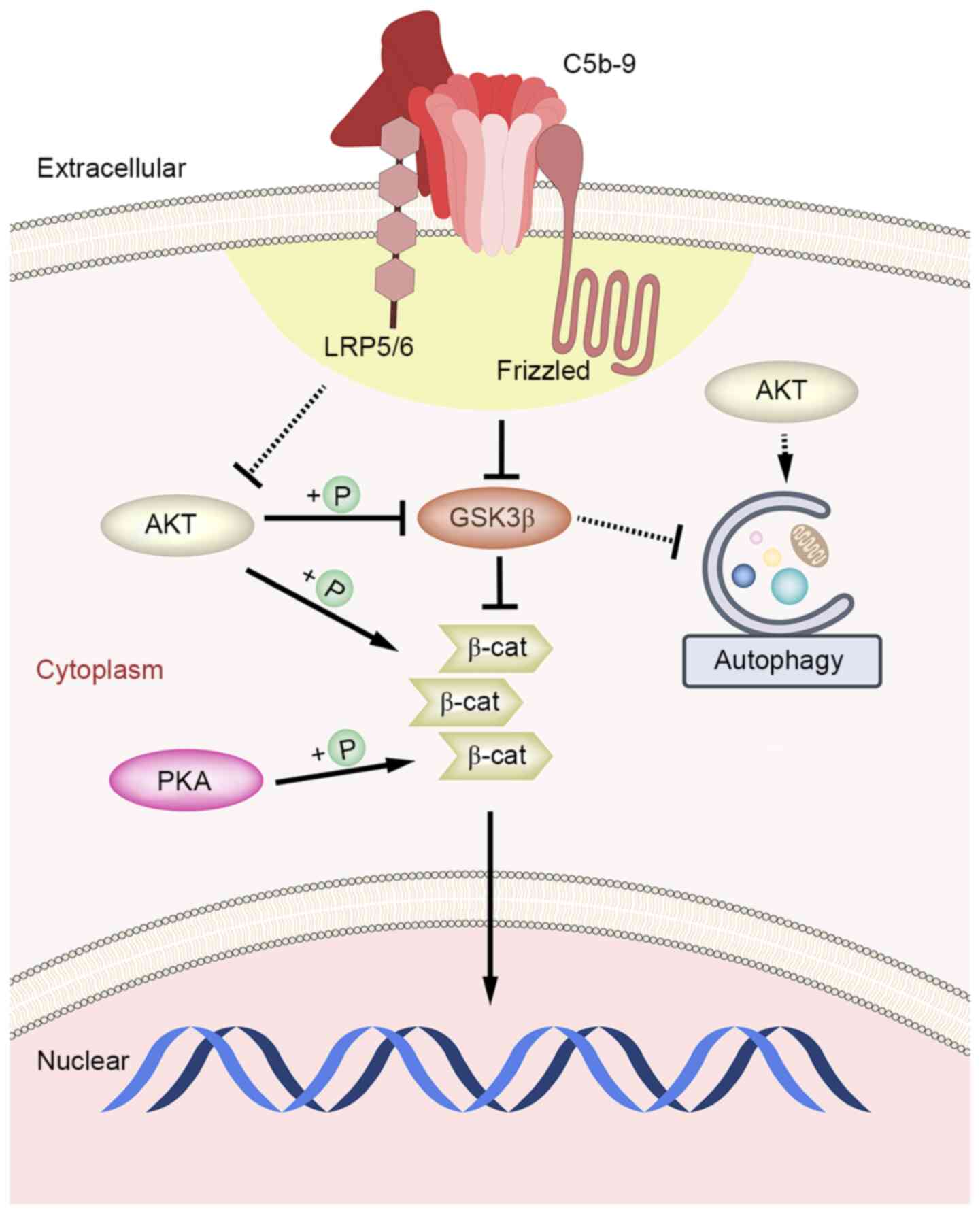|
1
|
Zhou L and Liu Y: Wnt/β-catenin signalling
and podocyte dysfunction in proteinuric kidney disease. Nat Rev
Nephrol. 11:535–545. 2015.PubMed/NCBI View Article : Google Scholar
|
|
2
|
Dai H, Liu Q and Liu B: Research progress
on mechanism of podocyte depletion in diabetic nephropathy. J
Diabetes Res. 2017(2615286)2017.PubMed/NCBI View Article : Google Scholar
|
|
3
|
Dai H, Liu F, Qiu X, Liu W, Dong Z, Jia Y,
Feng Z, Liu Z, Zhao Q, Gao Y, et al: Alleviation by Mahuang Fuzi
and Shenzhuo decoction in high glucose-induced podocyte injury by
inhibiting the activation of Wnt/β-catenin signaling pathway,
resulting in activation of podocyte autophagy. Evid Based
Complement Alternat Med. 2020(7809427)2020.PubMed/NCBI View Article : Google Scholar
|
|
4
|
Couser WG: Primary membranous nephropathy.
Clin J Am Soc Nephrol. 12:983–997. 2017.PubMed/NCBI View Article : Google Scholar
|
|
5
|
Ronco P and Debiec H: Pathophysiological
advances in membranous nephropathy: Time for a shift in patient's
care. Lancet. 385:1983–1992. 2015.PubMed/NCBI View Article : Google Scholar
|
|
6
|
Liu W, Gao C, Dai H, Zheng Y, Dong Z, Gao
Y, Liu F, Zhang Z, Liu Z, Liu W, et al: Immunological pathogenesis
of membranous nephropathy: Focus on PLA2R1 and its role. Front
Immunol. 10(1809)2019.PubMed/NCBI View Article : Google Scholar
|
|
7
|
Liu W, Gao C, Liu Z, Dai H, Feng Z, Dong
Z, Zheng Y, Gao Y, Tian X and Liu B: Idiopathic membranous
nephropathy: Glomerular pathological pattern caused by extrarenal
immunity activity. Front Immunol. 11(1846)2020.PubMed/NCBI View Article : Google Scholar
|
|
8
|
Nangaku M, Shankland SJ and Couser WG:
Cellular response to injury in membranous nephropathy. J Am Soc
Nephrol. 16:1195–1204. 2005.PubMed/NCBI View Article : Google Scholar
|
|
9
|
Cybulsky AV, Takano T, Papillon J and
McTavish AJ: Complement-induced phospholipase A2 activation in
experimental membranous nephropathy. Kidney Int. 57:1052–1062.
2000.PubMed/NCBI View Article : Google Scholar
|
|
10
|
Takano T, Elimam H and Cybulsky AV:
Complement-mediated cellular injury. Semin Nephrol. 33:586–601.
2013.PubMed/NCBI View Article : Google Scholar
|
|
11
|
Mizushima N, Levine B, Cuervo AM and
Klionsky DJ: Autophagy fights disease through cellular
self-digestion. Nature. 451:1069–1075. 2008.PubMed/NCBI View Article : Google Scholar
|
|
12
|
Hartleben B, Gödel M, Meyer-Schwesinger C,
Liu S, Ulrich T, Köbler S, Wiech T, Grahammer F, Arnold SJ,
Lindenmeyer MT, et al: Autophagy influences glomerular disease
susceptibility and maintains podocyte homeostasis in aging mice. J
Clin Invest. 120:1084–1096. 2010.PubMed/NCBI View
Article : Google Scholar
|
|
13
|
Asanuma K, Tanida I, Shirato I, Ueno T,
Takahara H, Nishitani T, Kominami E, Tomino Y, Arnold SJ,
Lindenmeyer MT, et al: MAP-LC3, a promising autophagosomal marker,
is processed during the differentiation and recovery of podocytes
from PAN nephrosis. FASEB J. 17:1165–1167. 2003.PubMed/NCBI View Article : Google Scholar
|
|
14
|
Lv Q, Yang F, Chen K and Zhang Y:
Autophagy protects podocytes from sublytic complement induced
injury. Exp Cell Res. 341:132–138. 2016.PubMed/NCBI View Article : Google Scholar
|
|
15
|
Wang L, Hong Q, Lv Y, Feng Z, Zhang X, Wu
L, Cui S, Hou K, Su H, Huang Z, et al: Autophagy can repair
endoplasmic reticulum stress damage of the passive Heymann
nephritis model as revealed by proteomics analysis. J Proteomics.
75:3866–3876. 2012.PubMed/NCBI View Article : Google Scholar
|
|
16
|
Fan T, Chen L, Huang Z, Wang W, Zhang B,
Xu Y, Mao Z, Hu H and Geng Q: Autophagy activation by rapamycin
before hypoxia-reoxygenation reduces endoplasmic reticulum stress
in alveolar epithelial cells. Cell Physiol Biochem. 41:79–90.
2017.PubMed/NCBI View Article : Google Scholar
|
|
17
|
Unno R, Kawabata T, Taguchi K, Sugino T,
Hamamoto S, Ando R, Okada A, Kohri K, Yoshimori T and Yasui T:
Deregulated MTOR (mechanistic target of rapamycin kinase) is
responsible for autophagy defects exacerbating kidney stone
development. Autophagy. 16:709–723. 2020.PubMed/NCBI View Article : Google Scholar
|
|
18
|
Kato H, Gruenwald A, Suh JH, Miner JH,
Barisoni-Thomas L, Taketo MM, Faul C, Millar SE, Holzman LB and
Susztak K: Wnt/β-catenin pathway in podocytes integrates cell
adhesion, differentiation, and survival. J Biol Chem.
286:26003–26015. 2011.PubMed/NCBI View Article : Google Scholar
|
|
19
|
Dai C, Stolz DB, Kiss LP, Monga SP,
Holzman LB and Liu Y: Wnt/β-catenin signaling promotes podocyte
dysfunction and albuminuria. J Am Soc Nephrol. 20:1997–2008.
2009.PubMed/NCBI View Article : Google Scholar
|
|
20
|
He W, Kang YS, Dai C and Liu Y: Blockade
of Wnt/β-catenin signaling by paricalcitol ameliorates proteinuria
and kidney injury. J Am Soc Nephrol. 22:90–103. 2011.PubMed/NCBI View Article : Google Scholar
|
|
21
|
Liu BL, Chen YP, Cheng H, Wang YY, Rui HL,
Yang M, Dong HR, Han DN and Dong J: The protective effects of
curcumin on -obesity-related glomerulopathy are associated with
inhibition of Wnt/β-catenin signaling activation in podocytes. Evid
Based Complement Alternat Med. 2015(827472)2015.PubMed/NCBI View Article : Google Scholar
|
|
22
|
Petherick KJ, Williams AC, Lane JD,
Ordóñez-Morán P, Huelsken J, Collard TJ, Smartt HJ, Batson J, Malik
K, Paraskeva C, et al: Autolysosomal β-catenin degradation
regulates Wnt-autophagy-p62 crosstalk. EMBO J. 32:1903–1916.
2013.PubMed/NCBI View Article : Google Scholar
|
|
23
|
Liu WJ, Li ZH, Chen XC, Zhao XL, Zhong Z,
Yang C, Wu HL, An N, Li WY and Liu HF: Blockage of the
lysosome-dependent autophagic pathway contributes to complement
membrane attack complex-induced podocyte injury in idiopathic
membranous nephropathy. Sci Rep. 7(8643)2017.PubMed/NCBI View Article : Google Scholar
|
|
24
|
Beekman C, Janson AA, Baghat A, van
Deutekom JC and Datson NA: Use of capillary Western immunoassay
(Wes) for quantification of dystrophin levels in skeletal muscle of
healthy controls and individuals with Becker and Duchenne muscular
dystrophy. PLoS One. 13(e0195850)2018.PubMed/NCBI View Article : Google Scholar
|
|
25
|
Cao J, Tyburczy ME, Moss J, Darling TN,
Widlund HR and Kwiatkowski DJ: Tuberous sclerosis complex
inactivation disrupts melanogenesis via mTORC1 activation. J Clin
Invest. 127:349–364. 2017.PubMed/NCBI View
Article : Google Scholar
|
|
26
|
Zhang Z, Liu T, Yu M, Li K and Li W: The
plant alkaloid tetrandrine inhibits metastasis via
autophagy-dependent Wnt/β-catenin and metastatic tumor antigen 1
signaling in human liver cancer cells. J Exp Clin Cancer Res.
37(7)2018.PubMed/NCBI View Article : Google Scholar
|
|
27
|
Li RN, Liu B, Li XM, Hou LS, Mu XL, Wang H
and Linghu H: DACT1 overexpression in type I ovarian cancer
inhibits malignant expansion and cis-platinum resistance by
modulating canonical Wnt signalling and autophagy. Sci Rep.
7(9285)2017.PubMed/NCBI View Article : Google Scholar
|
|
28
|
Luo W, Olaru F, Miner JH, Beck LH Jr, van
der Vlag J, Thurman JM and Borza DB: Alternative pathway is
essential for glomerular complement activation and proteinuria in a
mouse model of membranous nephropathy. Front Immunol.
9(1433)2018.PubMed/NCBI View Article : Google Scholar
|
|
29
|
Ronco P and Debiec H: Pathogenesis of
membranous nephropathy: Recent advances and future challenges. Nat
Rev Nephrol. 8:203–213. 2012.PubMed/NCBI View Article : Google Scholar
|
|
30
|
Beck LH Jr, Bonegio RG, Lambeau G, Beck
DM, Powell DW, Cummins TD, Klein JB and Salant DJ: M-type
phospholipase A2 receptor as target antigen in idiopathic
membranous nephropathy. N Engl J Med. 361:11–21. 2009.PubMed/NCBI View Article : Google Scholar
|
|
31
|
Ruggenenti P, Debiec H, Ruggiero B,
Chianca A, Pellé T, Gaspari F, Suardi F, Gagliardini E, Orisio S,
Benigni A, et al: Anti-phospholipase A2 receptor antibody titer
predicts post-rituximab outcome of membranous nephropathy. J Am Soc
Nephrol. 26:2545–2558. 2015.PubMed/NCBI View Article : Google Scholar
|
|
32
|
Borza DB: Alternative pathway
dysregulation and the conundrum of complement activation by IgG4
immune complexes in membranous Nephropathy. Front Immunol.
7(157)2016.PubMed/NCBI View Article : Google Scholar
|
|
33
|
Glassock RJ: Pathogenesis of membranous
nephropathy: A new paradigm in evolution. Contrib Nephrol.
181:131–142. 2013.PubMed/NCBI View Article : Google Scholar
|
|
34
|
Ma H, Sandor DG and Beck LH Jr: The role
of complement in membranous nephropathy. Semin Nephrol. 33:531–542.
2013.PubMed/NCBI View Article : Google Scholar
|
|
35
|
Couser WG and Nangaku M: Cellular and
molecular biology of membranous nephropathy. J Nephrol. 19:699–705.
2006.PubMed/NCBI
|
|
36
|
Paréj K, Kocsis A, Enyingi C, Dani R,
Oroszlán G, Beinrohr L, Dobó J, Závodszky P, Pál G and Gál P:
Cutting edge: A new player in the alternative complement pathway,
MASP-1 is essential for LPS-induced, but not for zymosan-induced,
alternative pathway activation. J Immunol. 200:2247–2252.
2018.PubMed/NCBI View Article : Google Scholar
|
|
37
|
Sastre-Perona A, Riesco-Eizaguirre G,
Zaballos MA and Santisteban P: β-catenin signaling is required for
RAS-driven thyroid cancer through PI3K activation. Oncotarget.
7:49435–49449. 2016.PubMed/NCBI View Article : Google Scholar
|
|
38
|
Soutto M, Peng D, Katsha A, Chen Z,
Piazuelo MB, Washington MK, Belkhiri A, Correa P and El-Rifai W:
Activation of β-catenin signalling by TFF1 loss promotes cell
proliferation and gastric tumorigenesis. Gut. 64:1028–1039.
2015.PubMed/NCBI View Article : Google Scholar
|
|
39
|
Wiza C, Nascimento EB and Ouwens DM: Role
of PRAS40 in Akt and mTOR signaling in health and disease. Am J
Physiol Endocrinol Metab. 302:E1453–E1460. 2012.PubMed/NCBI View Article : Google Scholar
|
|
40
|
Katoh M and Katoh M: Molecular genetics
and targeted therapy of WNT-related human diseases (Review). Int J
Mol Med. 40:587–606. 2017.PubMed/NCBI View Article : Google Scholar
|















